By John Y. Brown III, on Tue Nov 12, 2013 at 12:00 PM ET  Favorite first sentences of novels…. Favorite first sentences of novels….
The easy ones are “It was the best of times; it was the worst of times” from Tale of Two Cities.
Or perhaps “Call me Ishmael” from Moby Dick.
But for my money, it’s hard to beat this opening line from Life, The Universe and Everything from Douglas Adams.
“The regular early morning yell of horror was the sound of Arthur Dent waking up and suddenly remembering where he was.”
By Artur Davis, on Mon Oct 28, 2013 at 10:00 AM ET There was every reason to think that Jeff Greenfield’s alternative history of John F. Kennedy surviving Dallas would be one of the most compelling of the hundred or so commemoratives about the late president’s legacy during this 50th anniversary of his death. Greenfield’s last venture into political counter-factual, his 2011 Then Everything Changed (three novellas that sketch a Cuban Missile Crisis that turned into a short war, a Robert Kennedy victory in 1968 and a 1980 election that made Gary Hart President), is just a few shades away from brilliant and never ceases to be briskly entertaining. There is also a finely tuned precision in each scenario that captures just how much of history hinges on narrow moments, and how one altered tide rearranges careers and social structures alike.
Somehow, all of the gifts on display in Greenfield’s prior effort fail to strike gold a second time. His If Kennedy Lived seems oddly un-ambitious: the surprises are too unimaginative, the turns too predictable, and there is the unmistakable feel of a 2000 word magazine piece that was stretched into the more lucrative territory of a book. The earlier work seemed more inventive and poignant; the sequel appears burdened by the low expectation politics of the dismal three years since the original.
For example, Then Everything Changed is typically credited for its navigation between two points of historical determinism—one emphasizing the nuances of personalities and tactics, the other favoring elements like the country’s social and ideological mood. Therefore, war or peace in Cuba are linked to the finer points of Lyndon Johnson’s insecurities while two hundred pages later, a plausible path is sketched for how a certain kind of political tide could have carried a vessel as imperfect as Gary Hart to the presidency. There is cleverness in letting the reader see the extremes of both perspectives and inviting internal argument over which seems more predictive.
 If Kennedy Lived seems to wage the same debate over historical causality but to lean much more heavily toward the version that regards even the most talented figures as relatively incidental characters. The result is eight years of Kennedy that mimic the imperfections of his less glamorous succesors. In Greenfield’s account, we get the following ambivalent outcomes: a secret bargain that trades a Civil Rights Act for southern congressional hawks blessing a negotiated end to the Vietnam War, the misuse of regulatory power to smash a newspaper that was digging into Kennedy’s dirty sexual laundry, and a profile of domestic achievement that is respectable but not breathtaking. There is a sustained but uneven economic prosperity; a vague, short on substance campaign for more civic responsibility; a Voting Rights Act but a tepid assault on poverty; no urban riots but a rising sense of cultural polarization. If Kennedy Lived seems to wage the same debate over historical causality but to lean much more heavily toward the version that regards even the most talented figures as relatively incidental characters. The result is eight years of Kennedy that mimic the imperfections of his less glamorous succesors. In Greenfield’s account, we get the following ambivalent outcomes: a secret bargain that trades a Civil Rights Act for southern congressional hawks blessing a negotiated end to the Vietnam War, the misuse of regulatory power to smash a newspaper that was digging into Kennedy’s dirty sexual laundry, and a profile of domestic achievement that is respectable but not breathtaking. There is a sustained but uneven economic prosperity; a vague, short on substance campaign for more civic responsibility; a Voting Rights Act but a tepid assault on poverty; no urban riots but a rising sense of cultural polarization.
Read the rest of…
Artur Davis: A JFK Fantasy that Doesn’t Inspire
By John Y. Brown III, on Tue Oct 22, 2013 at 3:00 PM ET 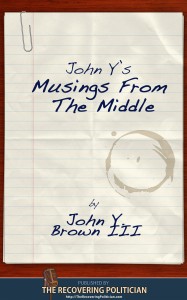 Click here to BUY MY BOOK! Two of my favorite books are The Bible and Musings from the Middle.
You are probably saying to yourself, “John, I know you wrote one of those books, right?”
Well, yes. I sure did. And thanks for remembering. (It was the latter book, of course.)
Now, I am not saying that the two books have anything even remotely in common. They don’t.
Is Musings from the Middle a great book? No. An important book? No. Not at all. A well written book? Not really. A good book? Not if you are sober while reading it. Is it even an insignificant book (as opposed to a book completely devoid of any substance)? Arguably but it is a very weak argument and, frankly, more of a frivolous musing.
But here’s the thing. The Bible has, I believe, 66 Books. And at times can get a little heavy trodding reading it. Wouldn’t it have helped to have had an extra book –just one–called “Musings?” If for no other reason just to break things up a little?
Maybe “Musings from Mathusula.” He lived a long time and would have had lots to muse about.
Imagine kids learning the books of the Bible. “Genesis, Exodus, Leviticus, Musings, Numbers, Joshua, Judges, Ruth.” It just flows, doesn’t it? OK, maybe not the first time you read it but conceivably it could grow on you over time.
Granted it is impossible to compete with Genesis and Exodus but most Biblical scholars would surely agree we could all use a mental break and a few laughs after Leviticus and before plowing into Numbers.
The Book of Musings wouldn’t teach anything. Just serve as a kind of a palette cleanser.
Well, an extra book of the Bible titled Musings is not going to happen. But you can still get the book Musings from the Middle, albeit completely separate from the Bible. And that is unfortunately probably the only way it will ever be sold.
And even though it wasn’t written by Mathusela people tell me I have Mathusula’s sense of humor.
Not really. I just made that up. But it is already a shameless sales pitch, so why not throw that in. Mostly I am just trying to get my sales rank on Amazon.com higher than 2000 times Mathusela’s age and figured since the Bible is selling so well…..
By John Y. Brown III, on Mon Oct 7, 2013 at 12:00 PM ET  Does it pay to be an author? Does it pay to be an author?
Of course it does.
Sometimes it pays a whole lot.
Other times not so much and you just have to hope to aim higher and hit the next time around.
And at still other times, depending on what sort of math calculations you choose to use, writing can actually cause you to lose money and make you wonder, “Is merely having a book listed on Amazon.com worth the money you are in debt to make this book?”
I can say that of the three categories I am probably most familiar with the third category.
 Above is a copy of my first check for profit on my book Musings from the Middle. I chose not to try to make money off it and charge only about a dollar profit a book just to cover costs. Above is a copy of my first check for profit on my book Musings from the Middle. I chose not to try to make money off it and charge only about a dollar profit a book just to cover costs.
As you can see my first check (which I have been advised is going to be by far my biggest) is $119.12. Now that’s nothing to sneeze at, of course, and is clearly in the “three figure range.” At least until you realize that has to cover a family of four including two teenagers with one in college and one just a few years away. When looked at that way, $119.12 doesn’t sound like as much as it did at first blush.
Given today’s college tuition prices, $119.12 will only cover about 33 minutes of one class your freshman year at a state university.
When you factor in the help I got putting the book together, organizing it, designing a cover, etc, well….all that cost about $400. So when you add the $119.12 to that figure you get something like….well, about — $280.
So let’s assume that over the next year (or five years), I get other checks totaling this amount? I am trying to be realistic. My book is currently ranked on Amazon.com at #1,972,197. Again, nothing to sneeze at. Until you realize that means that 1,972,196 books are ranked ahead of you.
So if I do get a total profit on the book of $240 that means I am only in the hole a mere $160.
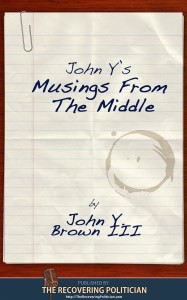 Click here to purchase Which now leads to the big question. Would I pay $160 to be able to say I have a book on Amazon.com?
The answer is, I apparently already have.
Had I not yet done it, I would be willing to pay…..hmmm…..maybe $150. And could see myself caving in if pushed on $160. So, I guess, all in all it is a good deal. And 33 minutes in a class at a state university is nothing to sneeze at–with today’s college tuition prices.
Especially if you are an author.
By Saul Kaplan, on Mon Sep 16, 2013 at 8:30 AM ET Click here to review or order
Dan Pink always makes me think. Each of his books elicits an “AHA” moment with staying power. Free Agent Nation changed the way I think about work and relate to institutions forever. A Whole New Mind rescued the right side of my brain from its inferiority complex and ignited a long-term love affair with design thinking. Dan’s book, Drive, is no different. It has crystallized my life-long instinct that our thinking about motivation and incentives is out of synch with the possibilities of the 21stcentury. Time to reboot motivation.
The 20th century was all about management. The North Star was how to get more people to go through the motions efficiently. Seeking personal meaning in work was a distraction. The best workers follow the rules, work hard, and smile. Work boiled down to an algorithm rendering out any creativity or autonomy. Fulfillment and empowerment were HR buzzwords and the “soft stuff” relegated to off-site retreats that don’t get in the way of real work. Incentives in the industrial era were all about carrots and sticks. Motivation was based solely on external factors including compensation, title, office, and promotion opportunities.
Early in my consulting career I worked for a boutique firm that specialized in sales force incentive compensation programs. I was consistently amazed by the gaping disconnect between the home office that inevitably over-engineered its goal setting and compensation practices and the actual behavior out in the sales territory. Sales representatives made quick work of these elegant plans figuring out how to game the system to optimize earnings. They cherry-picked the incentive plans based on experience, likelihood of earning a payout, and implications for the following year. The annual dance was de-motivating and rarely resulted in self-directed effort to maximize either the short or long-term value of customer relationships within a sales territory.
 I have observed legions of managers attempting to manipulate the dials of industrial era tools to optimize the output of employees. While it was clear to me that this approach sucked the meaning, autonomy, and motivation out of work for most employees it had the unfortunate advantage of delivering short-term business results, until it didn’t. The game changed when computers began to replace people doing repeatable work tasks. Technology also enabled repeatable work that still requires human involvement to move to lower cost locations. If it can be reduced to an algorithm it can either be virtualized or moved. This work is dehumanizing and uninteresting. Industrial era work has left the U.S. and it is not coming back. The work remaining to do requires both a new set of 21st century skills and a new approach to incentives and performance management. I have observed legions of managers attempting to manipulate the dials of industrial era tools to optimize the output of employees. While it was clear to me that this approach sucked the meaning, autonomy, and motivation out of work for most employees it had the unfortunate advantage of delivering short-term business results, until it didn’t. The game changed when computers began to replace people doing repeatable work tasks. Technology also enabled repeatable work that still requires human involvement to move to lower cost locations. If it can be reduced to an algorithm it can either be virtualized or moved. This work is dehumanizing and uninteresting. Industrial era work has left the U.S. and it is not coming back. The work remaining to do requires both a new set of 21st century skills and a new approach to incentives and performance management.
Read the rest of…
Saul Kaplan: Reboot Motivation
By John Y. Brown III, on Fri Sep 13, 2013 at 1:30 PM ET  Click here to purchase RP John Y. Brown, III appeared on “Louisville AM Radio,” with local media titan Rick Redding, to discuss his new book “Musings from the Middle.”
Click here for the podcast.
By John Y. Brown III, on Thu Sep 5, 2013 at 12:00 PM ET 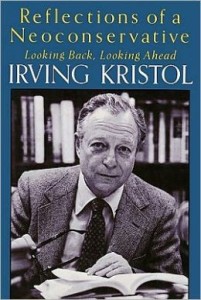 Click hew to review and purchase What book most dramatically influenced your political views?
This matter of a book influencing your political thinking isn’t quite as transformational as it sounds.
What it usually means is you found a book by an author who articulated well political beliefs and policy positions that affirmed your own developing but still unformed political inclinations.
For me (a life long Democrat), ironically, it is Irving Kristol’s “Reflection of a Neo-Conservative: Looking Back, Looking Ahead” written in 1983 and stumbled upon by me a few years later.
I liked it because it was at a time when the liberalism of the 30s–60s was coasting lazily along and in need of a more disciplined, modern and relevant set of guiding principles. I liked Kristol’s ability to insert morality without being too churchy; to respect and champion the best of market capitalism while being grounded in social justice and with a sense of community; a restrained foreign policy that didn’t meddle where it wasn’t provoked or nationally vital; a sense of tradition and patriotism that seemed lost on the liberalism prominent in the 1970s but also rationally grounded and not merely reflexive.
 Sadly, “Neo-Conservativism” which I viewed at the time of this book’s publication as a hardy and healthy critique of the stupor that parts of modern liberalism had fallen into (much like the same stupor conservatism fell into in the last decade) ended up as a disdained distortion of its original self in later years. Neo-conservitism, as a philosophy, became hijacked by disingenuous ideologues who transmuted it into a failed foreign policy overreach. Sadly, “Neo-Conservativism” which I viewed at the time of this book’s publication as a hardy and healthy critique of the stupor that parts of modern liberalism had fallen into (much like the same stupor conservatism fell into in the last decade) ended up as a disdained distortion of its original self in later years. Neo-conservitism, as a philosophy, became hijacked by disingenuous ideologues who transmuted it into a failed foreign policy overreach.
But its origins, as articulated by Irving Kristol, a man who wrote with clarity, intellectual originality, sincerity, and integrity toward the goal of a better political system for all spoke to me at an important point in my personal political development. Irving Kristol had an impact on me.
He was, to me, the “grown up in the room” of all the political commentators filling up the air and airwaves at a time I was trying to make some sense of it all. He wasn’t a firebrand or shock jock or whiny knee jerk type. He was a serious person with serious ideas articulated for a serious audience in hopes of making a positive impact on the country he lived in.
He affirmed many of the things I felt and made it OK for me to think that way. And OK, too, to keep thinking for myself.
Thank you, Irving Kristol.
How about you?
By Jeff Smith, on Thu Sep 5, 2013 at 10:00 AM ET From WKUR- Public radio, Kansas City:
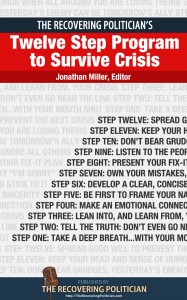 Click here to order We’ve all seen it, a politician’s life derailed by scandal or personal crisis. While in years past that meant retirement from public life, nowadays we’re just as likely to see these individuals re-emerge to campaign another day.
On Wednesday’s Up to Date, we look at crisis management with Jeff Smith, one of the contributors to The Recovering Politician’s Twelve-Step Guide to Surviving Crisis. A recovering legislator himself, Smith relates his path from the Missouri statehouse to prison. He reveals how the lessons he and others have learned in handling their crises can be beneficial even to those of us who live much more private lives.
Click here for the interview.
By John Y. Brown III, on Fri Aug 30, 2013 at 12:00 PM ET  How numbers lie! How numbers lie!
My book Musings from the Middle is currently ranked as the 865,544th best-selling book on Amazon.com.
To someone who didn’t know better, they may think, “Wow, John. That’s not very good.”
And that would be understandable…. But wrong.
Why?
 Click here to purchase Because numbers lie and the number (or ranking) 865,544th is compared to “all” books currently selling on Amazon.com.
That includes every genre fiction, non-fiction, sports, biography, crime, history, religion, comic, fix it, nature and so on and so on.
In the important and more appropriate category (or genre) for me, “Books published in July of this year in the non-fiction, human interest and humor categories that starts with the letter “M” and ends in the letter “E” and is written by a self-published author from Louisville, KY” well, let’s just say, my book would then rank in the Top Ten.
By Artur Davis, on Thu Aug 29, 2013 at 10:00 AM ET 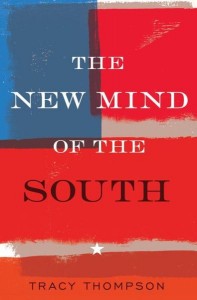 Click here to review and purchase The modern South is waiting for its epic; or failing that, for a book that captures how one region can be so distinctive and still emblematic of every national psychosis at the same time. Peter Applebome’s excellent 1997 work “Dixie Rising” (facts out of date, conclusions still dead on) comes the closest in a pretty sparse field to hitting that zone, but there is no southern themed version of what George Packer just did so skillfully in excavating the Great Recession in “The Unwinding”. Tracy Thompson’s sometimes very good but nowhere near great effort, “The New Mind of the South” doesn’t threaten “Dixie Rising’s” standing. It might have, if the author had done a little less translation and a little more interpretation.
Some of Thompson’s flaws are relatively lower case blunders: identifying William Jennings Bryan, the Democratic presidential nominee who reconfigured his party as a populist vehicle, as a third party candidate is not unforgivable, although it is the kind of gaffe that calls every other obscure detail into some degree of doubt. Some of her faults are the price of an approach that prefers the anecdote and the cherry-picked stat to heavy duty research. This is a book that devotes a chapter to Hispanic immigration while tossing off two sentences about Alabama’s controversial law; that reaches conclusions about the racialization of southern politics without acknowledging that at the time she went to print, the nation’s only black senator happened to be a South Carolina Republican who defeated Strom Thurmond’s son in a congressional primary.
But Thompson did not set out to write a tome or a textbook. And her intuition that the best impressionistic essays can be deep without being a fact dump is surely right. But where she falls short is that a stylishly rendered, graceful account still constantly feels one step away from the depth she was striving toward. This is well done description of a road trip laced with a little data, not so much analysis, and likely would have fared better with critics if it had been packaged that way.
Exhibit One: The sketch of teenaged Latinos in Asheboro, North Carolina is a smart, interesting read on their space between absorption into and alienation from their surroundings, and that duality does add a tricky side note to the rising Hispanic southern population. But that same half-in, half-out condition also applies equally well to, oh, inner city black teenagers in the Ivy League, or imported northern professionals filling downtown condos from Richmond to Nashville. Thompson dwells on whether that ordinary enough ambiguity in place identity will change the nature of southerness, as if it were something profound, but skims the surface of more immediately relevant questions: are Hispanics really the key to a Democratic revival in a Georgia or North Carolina or will the social conservatism of the region’s Latinos (which she pauses to address for only about a sentence) turn them into a bloc that Republicans may woo when the immigrant bashing drains out of the right’s system? Is their rightward lean on faith and family different than or tantamount to the one that black southerners possess but don’t take into the voting booth? And if those details are too tediously political, how about this big question: how is that Alabamians and Georgians who so conspicuously pride themselves on racial progress had no compunction passing some of the nation’s harshest immigration laws at obvious cost to their reputation? Thompson’s take on whether there is rationalizing or back sliding at the source of this tension would have been worth hearing.
 There is more of this pattern of reporting up to but not including the point of real insight. She is laser like in capturing Atlanta’s rising tide that didn’t lift enough boats, and is appropriately critical of Atlanta’s run of political mediocrity and its lapsed civil rights generation succession. All true, but interesting for this book’s purposes only if it traces a path that surfaces in the rest of the New South. Thompson never lets us know if a Birmingham, Memphis and Little Rock tell the same story, even if just by way of an aside. Moreover, by subscribing so predictably to the lament over right wing Republicans and self serving civil rights cut-offs, she brushes aside another thorny issue: why have southern progressives had so little to offer lately beyond a bought and paid for defense of plaintiffs lawyers and casinos? The absence of a reform culture in 21st century liberal southern politicians is the kind of thing a southern liberal like Thompson should have appreciated. But she opts for the cliché instead. There is more of this pattern of reporting up to but not including the point of real insight. She is laser like in capturing Atlanta’s rising tide that didn’t lift enough boats, and is appropriately critical of Atlanta’s run of political mediocrity and its lapsed civil rights generation succession. All true, but interesting for this book’s purposes only if it traces a path that surfaces in the rest of the New South. Thompson never lets us know if a Birmingham, Memphis and Little Rock tell the same story, even if just by way of an aside. Moreover, by subscribing so predictably to the lament over right wing Republicans and self serving civil rights cut-offs, she brushes aside another thorny issue: why have southern progressives had so little to offer lately beyond a bought and paid for defense of plaintiffs lawyers and casinos? The absence of a reform culture in 21st century liberal southern politicians is the kind of thing a southern liberal like Thompson should have appreciated. But she opts for the cliché instead.
For every spot-on instinct about southern ways—give her credit for placing the southerner’s casual interrogations as to who raised you and who you married as anxiety to find a zone of connection rather than snobbery or nosiness—there seems to be a spot where her antenna goes dead. One would like to know what Thompson makes of a more consequential oddity most northerners don’t know: the fact that the South’s politics are arguably the most classless in the country—downscale whites vote roughly the same as white southern economic elites, and not just when a certain black president is on the ballot. The phenomenon of upper income voters forming the newest element of the Democratic electoral base is altogether missing down South. Also, what does Thompson take from the perverse reality that the irrelevance of class, rather than birthing some new fangled populism, has instead produced an electorate disengaged from class oriented problems in one of the sections of American where they are festering?
Read the rest of…
Artur Davis: The New Mind of the South: A Native Southerner’s Miss
|
The Recovering Politician Bookstore
|
 Favorite first sentences of novels….
Favorite first sentences of novels….
















